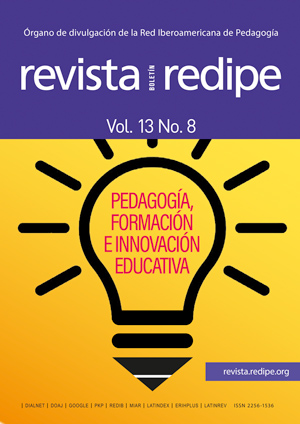Pedagogy and training: Keys to bring up of the mathematics teacher as a political subject
Main Article Content
Keywords
Training, Pedagogy, Political subject, Mathematics teacher, Higher education
Abstract
This reflective article critically addresses the training of mathematics teachers as a case for the integration of political subjects into a cohesive epistemological framework with pedagogy and training. The Pedagogy is recognized field of study that is focused on seeking to understand the conditions for the training of the subject and inquiring about the methods and purposes of forming that subject. The training of mathematics teachers has undergone significant transformations, evolving from classical humanist approaches to contemporary pragmatic training. The mathematics teacher, who is considered as a historical and political subject, is shaped by the surrounding environment and existing power dynamics while occupying a position that has been predefined by the functional world. The resulting constraints on the educator have given rise to the reflection on and rethinking of the training model centered on the neoliberal rationale. It is urged to adopt the sociopolitical dimension of mathematics education in order to generate training proposals that contribute to social transformation. In short, a comprehensive approach to mathematics pedagogy and educator training should seek to encourage the transcendence of man towards a spiritual being who strives for social integration, actively engages in self and societal reflection, and cooperates in the building of communities.
References
Aristizábal, M. (2006). La categoría saber pedagógico: una estrategia metodológica para estudiar la relación pedagogía, currículo y didáctica. Itinerantes. (4), 43-48
Aristizábal, M. y Agudelo, N. (2021). Another turn of the screw. On learning outcomes: Are other paths possible? Revista Historia de la Educación Latinoamericana, 23(36). https://doi. org/10.19053/01227238.13169
Bernal, D. (2016). El concepto de Bildung en Hegel y su incidencia en la educación. Universidad la Gran Colombia. Actas, III Jornadas de Investigadores en Educación. https://fh.mdp.edu. ar/encuentros/index.php/jie/3jie/ schedConf/presentations
Bishop, A. (2005). Aproximación sociocultural a la educación matemática. Universidad del Valle. Instituto de Educación y Pedagogía. Traducido por Perry, P. 141-148
Bruford, W. (2010). La tradición alemana de autocultivo: Bildung de Humboldt a Thomas Mann. Cambridge University Press.
Cossio Moreno, J. A. (2018). Tradiciones o culturas pedagógicas: del contexto europeo y norteamericano al conocimiento pedagógico latinoamericano. Actualidades Investigativas en Educación, 18(1), 522-545. https://dx.doi.org/10.15517/ aie.v18i1.31843
Cristancho, J. y Torres, N. (2018). La formación del maestro como sujeto social: desafío desde la transdisciplinaridad. Congreso Internacional de Educaciones, pedagógicas y Didácticas. http://repositorio.uptc.edu. co/handle/001/6108
Ernest, P. (1991). The Philosophy of Mathematics Education. New York: The Flamer Press.
Flórez Ochoa, R., y Vivas Ochoa, M. (2009). La formación como principio y fin de la acción pedagógica. Revista Educación y Pedagogía, 19(47). https://revistas. udea.edu.co/index.php/revistaeyp/ article/view/6680
Freire, P. (1993). Pedagogia da esperança: um reencontro com a pedagogia do oprimido. Paz e Terra.
Gadamer, H (1993). Verdad y método. Ediciones Sígueme.
García Perea, M.D. (2007). Formación. Concepto vitalizado por Gadamer. México: Castellanos
Gil, D. (2019). Una propuesta para estudiar la complejidad de los programas de formación de profesores de matemáticas. Revista científica, (34), 7-19. https://doi. org/10.14483/23448350.13552
Guacaneme, E., Obando, G., Garzón, D. y Villa, J. (2014). Colombia: Educación Matemática y Formación de profesores. Hacia la consolidación de un campo profesional y científico. En: Informe sobre la formación inicial y continua en América Central y el Caribe. Proyecto CANP, Costa Rica. ICMI.
Guerrero, O. (2008). Educación matemática crítica: Influencias teóricas y aportes. Evaluación e Investigación, 1(3), 63-78.
Gutiérrez, R. (2013). The Sociopolitical Turn in Mathematics Education. In Journal for Research in Mathematics Education. 44 (1), 37-68. https://doi.org/10.5951/ jresematheduc.44.1.0037
Jiménez, A. (2002). Quando professores de matemática da escola e da universidade se encontram: ressignificação e reciprocidade de saberes. [Tese de Doutorado. Universidade Estadual de Campinas; Orientador Prof. Dr. D. Fiorentini] http://repositorio.unicamp.br/ jspui/handle/REPOSIP/253213
Jiménez Espinosa, A. (2019). Formación de profesores de matemáticas: el caso de la licenciatura más antigua de Colombia. Praxis & Saber, 10(22), 45– 70. https://doi.org/10.19053/22160159. v10.n22.2019.7945
Jiménez Espinosa, A., Font Moll, V., Suárez Aguilar, Z., Díaz Moreno, M., Leguizamón Romero, J., Álvarez Cipamocha, A., Calle Palomeque, E, Sánchez Brualla, A., Breda, A. y Morales Maure, L. (2022). Hacia la transformación de la clase de matemáticas: algunas perspectivas. Editorial Universidad Pedagógica y Tecnológica de Colombia. https://doi. org/10.19053/9789586606608
Larrosa, J. (1996). La experiencia de la lectura. Estudios sobre literatura y formación. Barcelona: Laertes.
Lave, J., & Wenger, E. (1991). Situated learning: Legitimate peripheral participation. Cambridge University Press. https://doi. org/10.1017/CBO9780511815355
Licenciatura en Matemáticas y Estadística (LME). (2010). Proyecto Académico Educativo PAE de la Licenciatura en Matemáticas y Estadística de la UPTC Sede Duitama.



